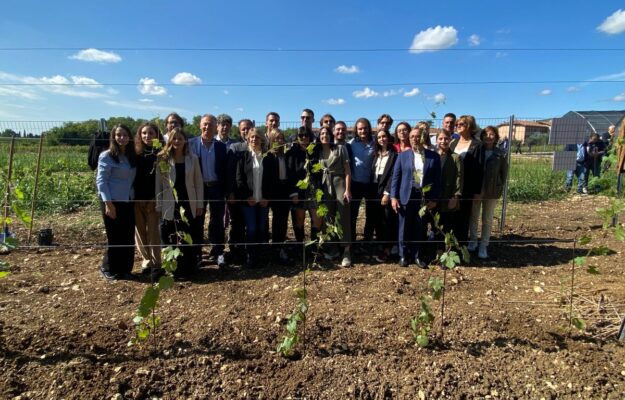In an era in which atmospheric phenomena are now “daily bread”, such as record temperatures, and therefore drought, but also the worrying rainfall and diseases that affect agriculture, the attention dedicated to plants and, in particular, to their competitiveness is growing. And here Assisted Evolution Technologies, Eat (or Tea, Tecnologie di Evoluzione Assistita, in italian) can come into play, which have the objective of genetically improving a plant, in order to make it more resistant and productive. Eat are based on biotechnological approaches allowing to transfer a whole gene, including its regulatory sequence, between two specimens that are interfertile with each other (cisgenesis) and to willingly and accurately modify a specific Dna sequence without moving it from its natural position inside of the genome (genome editing). A project leaning towards this direction consists in a first field trial of Chardonnay vine plants created with Assisted Evolution Technologies (Tea), performed by the agricultural genetics group lead by Mario Pezzotti from the Department of Biotechnology at the University of Verona and made possible also thanks to Edivite, a spinoff company born with the aim of developing vines with a better resistance against pathogens in order to reduce the use of phytosanitary treatments necessary for the protection of vineyards. The terrain is approximately 250 square meters large and is included inside of the experimentation field of the University of Verona in San Floriano, Valpolicella. The experiment involves the planting of 5 Eat Chardonnay plants and 5 control plants with the aim of verifying the resistance to one of the main pathogens of the vine, downy mildew and, consequently, the possibility of a lower use of plant protection products. The experimental test in the field will also allow to verify if the development, growth and production of the Eat plants will remain normal, when compared to the control ones.
During the launch event, recently - hosting, among the others, Pier Francesco Nocini, Rector of the University of Verona, Federico Caner, Councilor for Agriculture of the Veneto Region, and Antonella Furini, Director of the Department of Biotechnology, from Carlo Piccinini, President of FedagriPesca-Confcooperative, to Cristiano Fini, President of Cia-Agricoltori Italiani, from Christian Marchesini representing the Consorzio Vini Valpolicella and Confagricoltura, to Ettore Prandini, President of Coldiretti - Agriculture Minister Francesco Lollobrigida explained, in a live video, how “with the first field planting of Eat vines in Europe, Italy confirms its position at the forefront of research. A great result, thanks also to the commitment of centers of excellence such as the University of Verona. Research efforts in the primary sector must be supported, investing as many resources as possible in evolutionary techniques and innovation to have resistant and productive crops. The Government's commitment continues, in Italy as in Europe, where we will fight so that the Eu finally equips itself with an adequate regulatory framework on genomic techniques, in line with the current needs of the agricultural sector”. For the Rector of the University of Verona, Pier Francesco Nocini, “the start of this experimentation opens new scenarios for the development of research in the field of plant biotechnology and, at the same time, gives rise to new opportunities for innovation in the wine sector. A driving sector for the economy of the territory that will be able to benefit from the results of this study”. Sara Zenoni, professor of Agricultural Genetics at the University of Verona, said that “this event represents a fundamental stage for research in the field of plant biotechnology, as well as a concrete hope for greater sustainability in viticulture. Studying the vine, in fact, is not easy; it is a complex, perennial, arboreal system, which does well in the fields and does not like to grow in controlled laboratory conditions. Furthermore, the procedures applied to the vine system, a “non-model” system, require very long timescales, specialized structures and highly qualified personnel”.
Copyright © 2000/2026
Contatti: info@winenews.it
Seguici anche su Twitter: @WineNewsIt
Seguici anche su Facebook: @winenewsit
Questo articolo è tratto dall'archivio di WineNews - Tutti i diritti riservati - Copyright © 2000/2026







































































































































































































